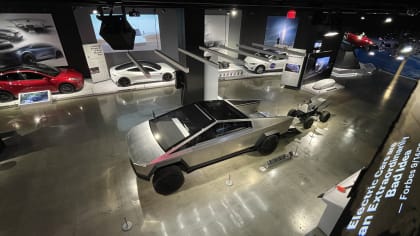When The Women Of The Mother Road Came To The Petersen

Telling The Untold Stories of Route 66
Filmmaker Katrina Parks' latest release - Route 66: The Untold Story of Women on the Mother Road - shines a light on some of the women integral to the history of Route 66.
By Roy Nakano
Sat, Aug 27, 2022 06:12 PM PST
All photos by the author Roy Nakano, if not noted otherwise. Featured image: Cynthia Hare, also known as Cynthia Troup, made significant contributions to the song "Route 66", but didn’t receive any songwriting credit ( book cover from Cynthia Hare’s "Once I was a Debutante", published by Ronne Troup).
There are countless stories about U.S. Route 66, but ever since John Steinbeck coined it the Mother Road in the The Grapes of Wrath, not enough has been told about the actual mothers and other women on the one-time Main Street of America. Filmmaker Katrina Parks has been trying to change that, first with her 2014 documentary, The Harvey Girls: Opportunity Bound, and now in a big way with the release of Route 66: The Untold Story of Women on the Mother Road, the mothers and other women of the Mother Road get the front and center attention long overdue.
Parks has been prolific in her field, having worked for A & E, Discovery Channel, Fox, PBS, Planet Green, Spike, TLC and The Travel Channel. Her film “Wrappings” won a SASA Award from the United Nations.
Route 66: The Untold Story of Women on the Mother Road explores how women overcame segregation and gender discrimination to build fulfilling lives for themselves and generations to come on America's most beloved road.

The Stories Behind the Stories
In early August, the Petersen Automotive Museum, along with support from the National Trust for Historic Preservation, the Harley Davidson Foundation, California Historic Route 66 Association, Mark and Miwako Drabkin Foundation, and Mother Road Brewing Company, hosted a lively evening with Katrina Parks, along with clips from her film series, and live appearances from some of the people that are in her documentary series. Among the film segments shown:
She Got Her Licks on Route 66
Cynthia Troup, the spouse of Bobby Troup. The two traveled from Pennsylvania to California, taking Route 40 and then Route 66 in their 1941 Buick across Route 66. The trip inspired Bobby to write a song. He originally was going to write a tune about Route 40, but Cynthia suggested the title "Get Your Kicks on Route 66". Despite her contributions, Cynthia Troup’s name is missing from the credits to this famous song.
The film clip was followed by an appearance from Jamie Lawrence of TroupVintage, and granddaughter of Cynthia and Bobby Troup, recounting the story of Cynthia Troup, also known as Cynthia Hare, to Occidental College Associate Professor and KPFK Reporter Caroline Hedman. Hare wrote about her life in the 1967 autobiography "Once I Was A Debutante".

The Green Book and Safe Passage
Documentarian Candacy Taylor, who authored "Overground Railroad: The Green Book and the Roots of Black Travel in America", described Victor H. Green’s "Negro Travelers’ Green Book" in the second clip shown at the Petersen. Taylor described the Green Book’s historic role in identifying hotels, gas stations, drug stores, barbershops and other commercial entities that served African American families in the Jim Crow era.
"44 out of the 89 counties along Route 66 were sundown towns. And sundown towns were all-white towns - and all-white on purpose. There were alarms that sounded at six o’clock at night, warning Black people that they needed to leave. So, given that half the towns along Route 66 were sundown towns, you really needed a guide", said Taylor.
The Women Behind Monrovia’s Strawberry King
Keiko Sakatani, granddaughter of Yutaka Uyeda, Monrovia’s Strawberry King, told the story about how her family grew and sold strawberries along Route 66 on Huntington Drive. After the film clip, Sakatani took to the stage, along with Pasadena City College Associate Professor and LACar writer Susie Ling. Professor Ling asked Sakatani about the early years in Monrovia. "My grandmother, mother and aunt sold the fruits. From the beginning, my grandmother took care of the money."
Sakatani closed by recounting the harrowing account of her family’s uprooting and incarceration in Santa Anita’s converted horse stables, and then in the Heart Mountain, Wyoming concentration camp after the bombing of Pearl Harbor.

The Mitla Café Story
The story behind San Bernardino’s Mitla Café was told in the Katrina Parks film by Irene Montanyo, the daughter-in-law of its founder, Lucia Rodriquez, and by Patty Oquendo, her granddaughter. "She brought her daughters to work with her to help, so it was all women", said Oquendo. The Mitla Café on Route 66 in San Bernardino thrived, particularly in the 1950s. So much so, that it caught the attention of Rodriguez’s neighboring business owned by Glen Bell. The Mitra Café’s taquitos dorados con carne molida inspired Bell’s new business venture selling hard-shell tacos under the name Taco Bell.

The Chicken Boy
Perhaps the wildest presentation of the evening was of the famed Route 66 landmark, Chicken Boy, and the efforts by book designer and graphic artist Amy Inouye to save and ultimately preserve the Chicken Boy. Inouye took to the stage after the film clip to share more stories about the iconic landmark on Figueroa Street in Highland Park.
We Drove Through Cities and Towns
One of the more touching moments of the evening came when Keiko Sakatani read Steve Garnaas-Holmes’ Stories from Unfolding Light. Sakatani thought it reflected perfectly the untold stories of Route 66 when Garnaas-Holmes wrote, "We drove through cities and towns… Each house a story. So many stories… The people we saw - the people you pass by - every single one is a story with a beginning and a middle, and you only know one sentence of it."

A Packed House
Reservations for the evening closed out several days beforehand. It’s hard to pinpoint any one factor responsible for bringing out the audience to this packed house. Certainly, the subject matter was a story largely untold. But the Petersen had already established a reputation for putting together interesting programs on subjects one wouldn’t expect from an automotive museum.
Much of the credit goes to the Petersen’s Director of Education and Programming, Jason Hartwig, whose novel programs we reported on before (see LACar’s Wheels of Freedom – The Car and Civil Rights). On the other hand, the complimentary assortment of beers offered by the Mother Road Brewing Company must have played a role in bringing people out for this Thursday evening event on the corner of Wilshire and Fairfax.

To learn more about “The Women On The Mother Road”, visit route66women.com.
To learn more about programs at the Petersen Automotive Museum, visit Petersen.org.
About The Author

Roy Nakano gave birth to LACar in the late '90s, having previously delivered LA Audio File back in the '80s. Aside from the occasional review, Roy likes to stray off the beaten automotive path: "Six Degrees of Reparations" reflected on the regretful ethical paths taken by car companies throughout history. "Traveling Through the Past and Present of the Green Book" looked at businesses that took a stand against racism and the man that wrote the book on where to find them. "Best Cars to Drive in Rush Hour Traffic" was an LACar guide published in the pre-GPS era. "In Search of the First Datsun 510 Tuner" looked at one of the milestones in the origin of import tuners. And "Us vs Them" examines the instances when rivalry among automotive enthusiasts crossed the line to violence and even death.






